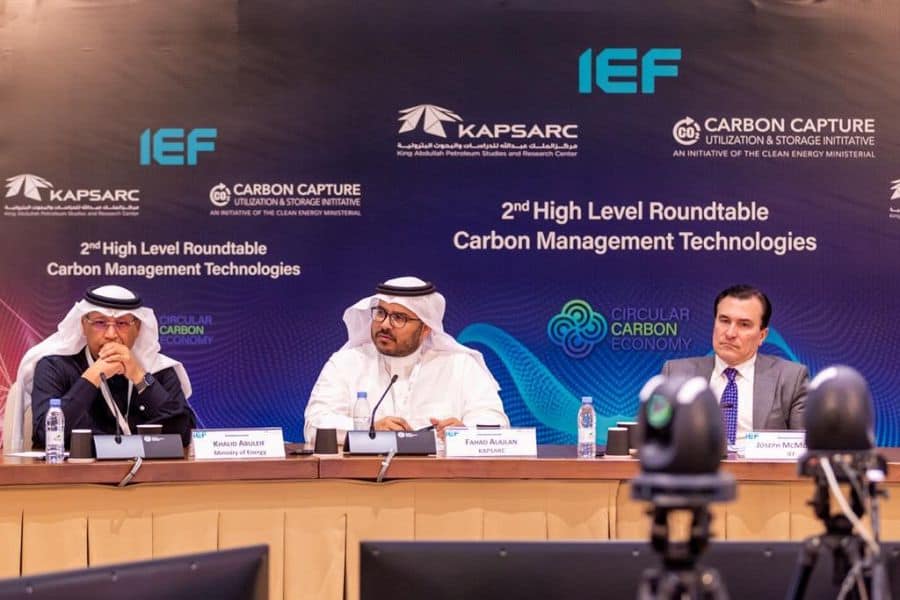Riyadh, Saudi Arabia – Net-zero goal cannot be achieved without carbon capture and there is a need to scale up carbon capture and storage over the coming years to reach zero emission targets, Fahad Alajilan, President of the King Abdullah Petroleum Studies and Research Center (KAPSARC), has said.
KAPSARC co-hosted on Thursday the second International Energy Forum (IEF) high-level roundtable on Carbon Management Technologies.
Held in collaboration with the IEF and the Clean Energy Ministerial, the roundtable is aimed to build momentum behind carbon capture utilization and storage (CCUS) projects in order to reach net-zero carbon emissions, SPA reported.
Alajlan added that the world needs a new approach to attract financiers to support CCS initiatives, and that these kinds of workshops will allow experts to share their knowledge and identify ways to promote carbon management technologies.
Joseph McMonigle, Secretary General IEF, said, “We need to make 2023 the year of CCUS, and enhance collaboration to improve the investment in and usage of this technology.”
Fatih Yilmaz, a KAPSARC expert in the Climate and Sustainability Program, said that a recent study by the International Energy Agency listed CCUS as one of the seven pillars of achieving net-zero by 2050. He added that the world needs to reach carbon dioxide capture capacity of roughly 8 giga tons by 2050.
Yilmaz stressed that the average annual investment in CCUS had been around $2 billion to $3 billion until last year. In 2022, it hit $6.4 billion, with many more potential investment opportunities for clean hydrogen.
KAPSARC is an advisory think tank that seeks to advance Saudi Arabia’s energy sector and inform global policies through evidence-based advice and applied research. It has published over 700 papers on topics from climate change policy and governance to energy and economic vulnerability.
The International Energy Forum (IEF) is the world’s largest international organization of energy ministers, with representatives from 71 countries, including both producing and consuming nations. It is the global home of energy dialogue.
The Clean Energy Ministerial (CEM) brings together a community of the world’s largest and leading countries, companies, and international experts to accelerate clean energy transitions.
Saudi meet stresses carbon capture vital for net-zero goals
2 min read

- The King Abdullah Petroleum Studies and Research Center held a high-level roundtable on Carbon Management Technologies.
- In 2022, investment in the carbon capture utilization and storage hit $6.4 billion.
SPEEDREAD
Today's Headlines
The most important news stories of the day, curated by Post editors and delivered every morning.
By signing up you agree to our Terms of Use and Privacy Policy.
Most Read
Special economic zones are a new craze in Middle East
Saudi Film “Norah”, backed by Red Sea Fund, secures official selection at Cannes
Thousands gather in Iran in show of support for attack on Israel
Meet Middle East tourism’s power players
Business and leisure combo drives GCC tourism boom
From sand dunes to boardrooms: Strategies for success in challenging times
Kremlin, the world, urge restraint following Iranian strikes on Israel
